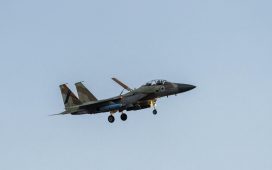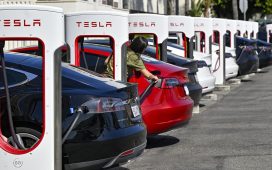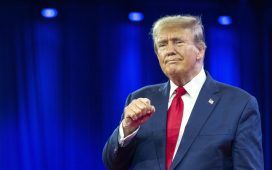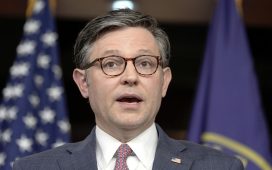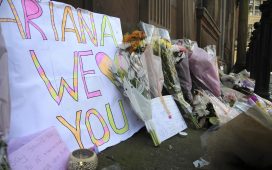With help from Stephanie Beasley and Brianna Gurciullo
Editor’s Note: This edition of Morning Transportation is published weekdays at 10 a.m. POLITICO Pro Transportation subscribers hold exclusive early access to the newsletter each morning at 6 a.m. To learn more about POLITICO Pro’s comprehensive policy intelligence coverage, policy tools and services, click here.
Story Continued Below
— Boeing CEO Dennis Muilenburg took to prime time to give an update on the company’s work on the grounded 737 MAX.
— Changes at TSA revealed this week include a new medical marijuana policy for travelers and a revised performance management systems for baggage screeners.
— Fifteen New York lawmakers are urging the Metropolitan Transit Authority to not purchase rail cars manufactured by a Chinese state-owned company.
IT’S THURSDAY: Thanks for tuning in to POLITICO’s Morning Transportation, your daily tipsheet on all things trains, planes, automobiles and ports. Get in touch with feedback, tips or song lyric suggestions at smintz@politico.com or @samjmintz.
LISTEN HERE: Follow MT’s playlist on Spotify. What better way to start your day than with songs (picked by us and readers) about roads, rails, rivers and runways?
BOEING’S CHIEF ON CBS EVENING NEWS: The CEO of Boeing told CBS News that he thinks the grounded 737 MAX will return to service by the end of 2019 or perhaps sooner. Muilenburg also said he’d let his family fly on the MAX “without any hesitation,” and that Boeing won’t rebrand the plane (as President Donald Trump proposed). Our Brianna Gurciullo has more.
THE WAIT CONTINUES: Airlines, for their part, are expecting at least 10 to 12 more weeks of delay before the MAX gets back in the air, The Wall Street Journal reports. That’s according to Alexandre de Juniac, director general of the International Air Transport Association. And it comes with several other challenges for the company, including a possible lag between regulators in different countries approving the plane to fly again as well as convincing passengers that the MAX is safe to fly on.
ICYMI: Trump repeated his claims about aviation innovation while in Japan this week: “They’re always coming up with new ideas. They’re making planes so complex you can’t fly them. … We all want innovation, but it’s too much,” he said.
FLYING HIGH: Believe it or not, airline satisfaction is at its highest point ever, according to a survey by J.D. Power, the marketing information services company that you probably know from its car awards and ratings. Citing “a combination of newer planes, better ticket value and improved customer touchpoints,” the firm said overall satisfaction with airlines is at its highest point in measured history, up 11 points (on a 1,000 point scale) over a record-setting performance last year.
What’s driving it: “New technology investments have dramatically improved the reservation and check-in process. Fleets are newer and travelers generally feel that they are getting great value for their money. These improvements have been most profound in the traditional carrier segment, where customer satisfaction has climbed considerably,” said J.D. Power’s travel intelligence lead Michael Taylor.
YOU CAN BRING YOUR WEED ON THE PLANE NOW (KINDA): TSA updated its marijuana policy over the holiday weekend, the news blog Marijuana Moment reported earlier this week. The agency changed the medical marijuana section on its “What Can I Bring” website from no to yes, with special instructions. “Specifically, the agency is clarifying that hemp-derived CBD products may now be carried on planes under certain circumstances,” MM writes.
An agency spokesperson told MM that the policy change follows the FDA’s approval of a cannabis-derived anti-seizure medication called Epidiolex, designed for children with pediatric epilepsy.
Read more on the change from MM here, and check out TSA’s updated website here.
A HARD DAY’S NIGHT: TSA announced Wednesday that it has also made changes to its performance management systems for bag screeners that include removing some of the “burdensome reporting requirements” for employee evaluations — making it easier for managers to identify which screeners should be eligible for raises. Also, screeners selected as “model officers” under a new recognition program will become eligible for “additional salary increases, monetary awards, and/or other forms of special recognition over and above the performance rating process,” TSA said. The changes will go into effect in fiscal 2020.
WELCOME TO THE CLUB: Boston’s Logan Airport is the latest hub to team up with Clear, a company developing biometrics technology for security checkpoints. Travelers using Logan’s Terminal A can sign up for the service, which says it helps get passengers through security more quickly and easily for $15 a month.
FROM THE PROBLEM SOLVERS: Infrastructure talks between the White House and Democrats may have blown up earlier this month, but ideas are still flowing about how to make good policy going forward. The Problem Solvers Caucus, a bipartisan working group in Congress, released a new report on Tuesday offering a few suggestions on infrastructure. It includes expanding infrastructure financing options, incentivizing states to adopt P3 legislation, and streamlining project permitting. The report also calls for indexing and modernizing the gas tax.
And Brookings fellow Shalini Vajjhala offers this advice to the Trump administration and Congress: Don’t focus on making big dollar announcements. Instead, reward proactive investments by states and cities, focus on early stages of projects, and prioritize resilience.
STOP, THE RAIL YOU SAVE MIGHT BE YOUR OWN: Fifteen members of New York’s congressional delegation sent a letter to MTA leaders urging the agency to not buy rail cars from China Railway Rolling Stock Corp. over cybersecurity concerns. “The lawmakers are requesting MTA provide additional information about any briefings it has had with DHS or other agencies to discuss risks and to specify any cybersecurity protocols it’s put in place for the Chinese company, among other things,” our Stephanie Beasley reports.
Background: Lawmakers have grown increasingly concerned as CRRC continues to land major contracts throughout the United States. A bill, S. 1663 (116), introduced in the Senate earlier this month would prohibit Washington’s transit agency from using federal funds to buy Chinese-manufactured rail cars. And another bill, S. 846 (116), would more broadly prevent FTA funds from going toward state-owned enterprises. That measure has the backing of the Alliance for American Manufacturing, which wrote to lawmakers in support of its House counterpart this week.
— “With his job gone, an autoworker wonders, ‘what am I as a man?’” New York Times.
— “10 things I learned carting a stroller on transit for two years.” Greater Greater Washington.
— “You can soon use a Fitbit to pay for a subway or bus ride in NYC.” The Verge.
— “Studies don’t support Elon Musk’s autopilot safety claims.” The Information.
— “Portland, OR launches pilot with Sidewalk Labs location data software.” Smart Cities Dive.
— “Uber will ban riders from app if they repeatedly misbehave.” Associated Press.
— “EU emissions go up as transport pollution weighs on climate efforts.” POLITICO Pro.
DOT appropriations run out in 123 days. The FAA reauthorization expires in 1,584 days. Highway and transit policy is up for renewal in 492 days.

